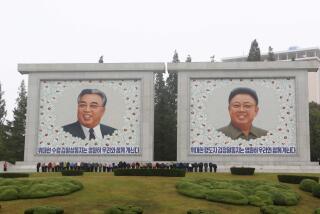Invitation to a Mutual Afghan Exit
The Bush Administration is publicly signaling its interest in cutting a mutually beneficial deal with the Soviet Union over Afghanistan. The United States is ready to end its 11 years of covert military support to the Afghan rebels if the Soviets slash their military aid to the Marxist government in Kabul. If Moscow agrees, the Administration would have a strong case to take to Congress, where the moujahedeen insurgents have always had a sympathetic constituency. If Moscow doesn’t agree, U.S. aid--believed to be about $250 million a year--would likely continue, further fueling a brutal civil war that it is probably beyond the capacity of either side to win.
The prospect of unending military stalemate and increasingly pointless killings isn’t the only reason for the reappraisal in U.S. policy. Disillusionment with the aims and actions of the major rebel factions--there are seven, reflecting historic rivalries and suspicions--has prompted reconsiderations about how U.S. interests could best be served. Three moujahedeen leaders, all heads of Muslim fundamentalist groups, openly backed Iraq’s Saddam Hussein in his war with the American-led coalition. Others are known to be involved in drug trafficking. These are not the kind of people Washington really wants to see running Afghanistan.
The Soviet army’s withdrawal from Afghanistan in 1989, after a decade of fighting to prop up a succession of puppet Communist regimes, allows U.S policy-makers to take a clearer look at the options. The Soviet invasion of Afghanistan was a naked power grab, and aid for the rebels was justified politically as well as morally. But Afghanistan has ceased to be a cockpit of Cold War confrontation. Instead, that always unruly land has to a great extent reverted to traditional internecine struggles over power and territory.
Mediating a compromise between the central government and the rebels has proven to be beyond the powers of Moscow and Washington. And so the fighting--which has already claimed an estimated 1 million lives--has gone on. Meanwhile, millions of Afghan refugees live a squalid, marginal existence in camps in Iran and Pakistan. The long-suffering people of Afghanistan deserve better, and the fiscally strapped U.S. and Soviet governments can surely find more productive uses for their scarce foreign aid funds.
The Bush Administration is signaling that it’s conditionally ready to call a halt. A reciprocal Soviet gesture could be all that’s needed to finally extract the two countries from a conflict that benefits neither--and that has now become morally insupportable besides.
More to Read
Sign up for Essential California
The most important California stories and recommendations in your inbox every morning.
You may occasionally receive promotional content from the Los Angeles Times.










